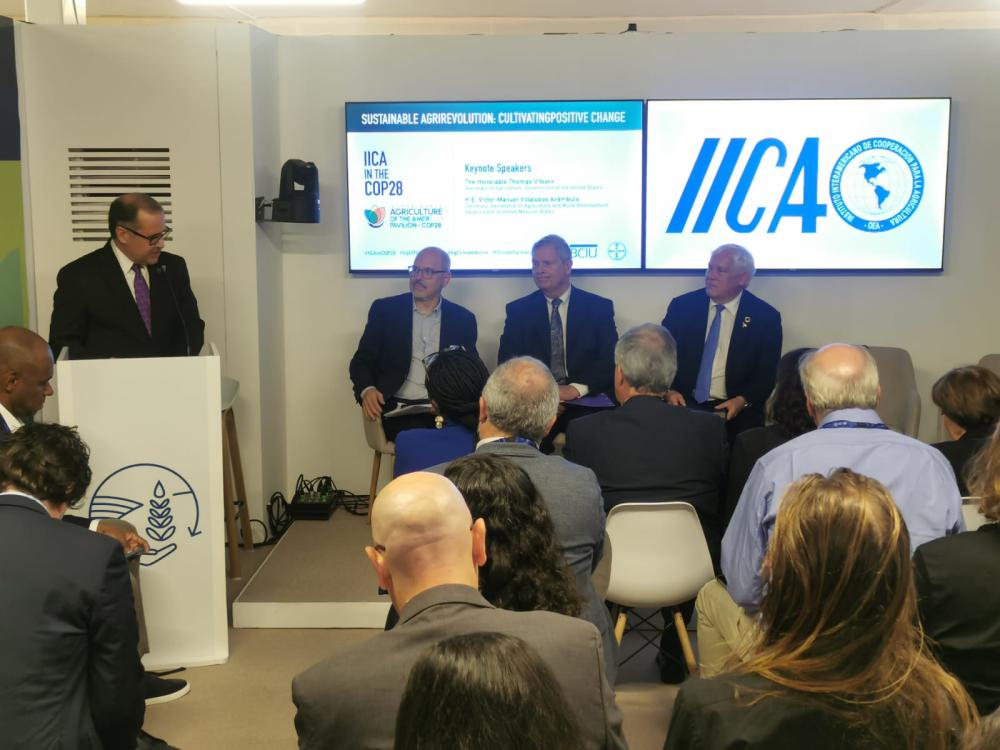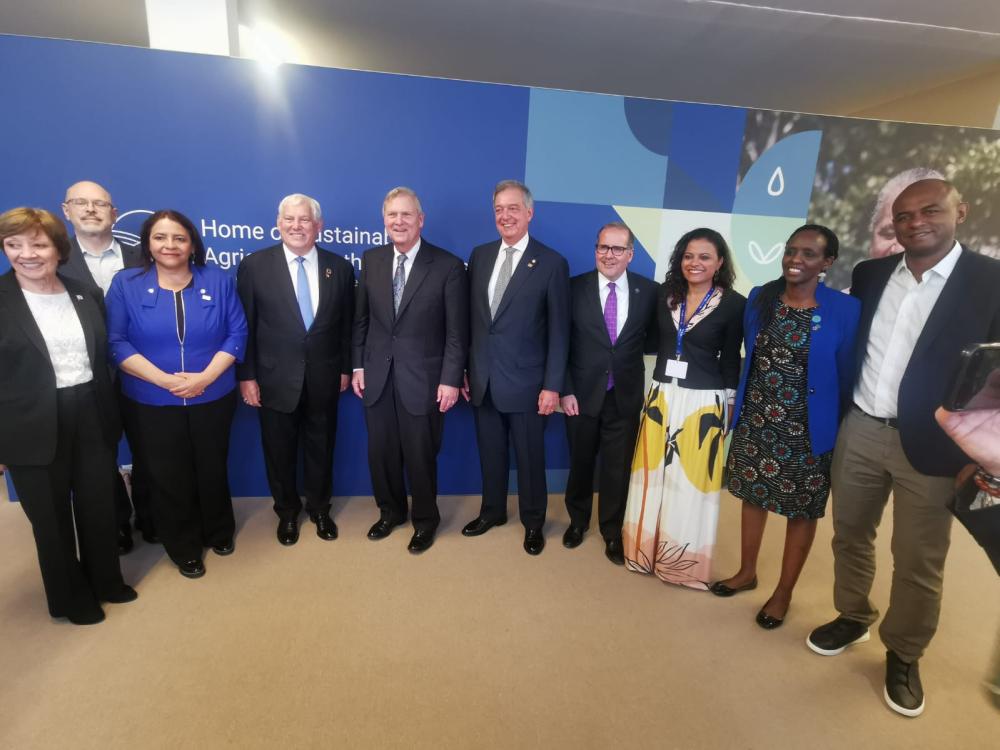U.S. and Mexico Secretaries of Agriculture make a joint appearance at the IICA COP28 pavilion, maintaining that the Americas must lead the way for the world in ensuring that agriculture is part of the solution to climate change

Dubai, United Arab Emirates, 10 December 2023 (IICA) – The Secretaries of Agriculture of the United States and Mexico made a joint appearance at COP28, agreeing that the Americas should be a world leader in agrifood production innovation, in order to strengthen the role of the sector as part of the solution to climate change.
Tom Vilsack, who heads the United States Department of Agriculture (USDA) and Victor Villalobos, Secretary of Agriculture and Rural Development of Mexico, participated together at a public event in the pavilion that the Inter-American Institute for Cooperation on Agriculture (IICA) has set up at Expo City in Dubai, in collaboration with its 34 Member States and private sector partners.
Both Vilsack and Villalobos concurred that investing in the agriculture sector to promote technology transfer and the capacity development of producers is essential to ensure that agriculture contributes to the climate change mitigation and adaptation goals that the international community set in 2015, through the Paris Agreement.
The two senior officials arrived at the Home of Sustainable Agriculture of the Americas—the name of IICA’s pavilion at the United Nations Climate Change Conference—and sparked massive public interest in the role of agriculture in the hemisphere and in the transformation of current production and consumption practices.
IICA organized the event in partnership with the Business Council for International Understanding (BCIU), an organization that works to promote partnerships between governments and the private sector to drive economic development. BCIU President and CEO, Peter Tichansky, and Deputy Director General of IICA, Lloyd Day, introduced the United States and Mexican secretaries, whose presentations were followed by a high-level panel discussion, with authorities, food company leaders and private sector representatives debating the future of agrifood systems.
“It is enormously important that we were able to ensure that the agriculture sector has a presence and voice at COP”, said Vilsack, who maintained that only through collective action will agriculture be able to contribute to addressing the causes and consequences of climate action”. The USDA head made special mention of IICA’s valuable work to build a more resilient, inclusive and sustainable agriculture sector in the hemisphere.
Vilsack advised that the United States is making sizeable investments to transform agriculture, through innovation and science. “Now is the time for farmers to harness all available financing tools for climate action, including voluntary carbon markets and green funds. We must also accelerate the implementation of methods to measure emission reduction and carbon sequestration. We can make the agriculture sector more sustainable, while also generating more income for farmers”, he stressed.

Agriculture, key for the future
Villalobos reflected that humanity is now at a critical moment and that agriculture will determine the future.
He pointed out that, “Although enormous amounts of food are being produced, the shadow of hunger is still present in the world. It is vital that we take action to mitigate the impact of climate change and build infrastructure to equip agrifood systems to adapt to the environmental crisis. In other words: food for all”.
Villalobos specified that agrifood systems are facing the challenge of reducing waste, which causes 30% of the resources invested to be lost.
“It is critical that we ensure that funding for agricultural transformation is reaching producers and is used to address the issues that matter: capacity development, innovation in tackling the risks of pests and diseases, as well tools to respond to extreme temperatures and the alteration of rainfall patterns, among other challenges”, he said.
In conclusion, he stressed that, “We must define a new paradigm to guarantee the planet’s food security and so this in harmony with the environment”.
IICA Director General, Manuel Otero, highlighted the fact that the adoption of regenerative agriculture—which emphasizes soil health care, proper water use, integrated pests and disease management and biodiversity preservation—offers a pathway to increase productivity and simultaneously contribute to the mitigation of the environmental crisis.
Otero insisted that, “IICA is working to promote collective action that makes an impact. The only way that we will be able to guarantee that the changes that are taking place are inclusive is through public and private sector collaboration and the participation of farmers at the discussion table”.
Cultivating positive transformations
The panel discussion that followed proposed that farmers and industrial leaders be sensitized to the importance of regenerative agriculture and sustainable practices.
Participants included Renata Miranda, Secretary of Innovation, Sustainable Development, Irrigation and Cooperatives at the Ministry of Agriculture and Livestock of Brazil; Agnes Kalibata, President of the Alliance for a Green Revolution in Africa (AGRA); Mauricio Rodrigues, President of Bayer Latin America; Qingfeng Zhang, Director of Agriculture at the Asian Development Bank; and Bruno Pozzi, Deputy Director of the Ecosystems Division of the United Nations Environment Program (UNEP).
Rodrigues explained that, “Regenerative agriculture is teaching us that we can produce more with less and also restore ecosystems at the same time. We are focusing on mixing innovation with information and on collaboration and partnerships with producers, governments and other private sector companies”.
On the other hand, on behalf of the Government of Brazil, Renata Miranda congratulated IICA for its efforts. “You have played a vital role in positioning the agriculture sector at COP. The Americas is the only region that extends from the north at one extreme to the extreme south. Therefore, we know the impact of climate change on production all too well. We cannot be absent from this negotiating forum”.
More information:
Institutional Communication Division.
comunicacion.institucional@iica.int